Psychology in Counseling: Theories of Development and Personality
VerifiedAdded on 2019/12/17
|13
|3573
|508
Report
AI Summary
This report provides a comprehensive overview of several key theories relevant to counseling and human development. It begins by exploring Freudian theory, including its main concepts and practical applications in counseling, followed by Erikson's psychosocial stages and how they can be utilized in counseling practice. The report then delves into the stages of lifespan development and their effects on counseling, Piaget's stages of cognitive development, and the elements of the nature-nurture theory. Maslow's Hierarchy of Needs is also examined in the context of counseling. Furthermore, the report discusses two personality and development theories and their relevance to counseling, emphasizing required documentation. It concludes by comparing and evaluating the contributions of each theorist to understanding personalities, cognitive, and human development, and applying these theories to assist a client's understanding of their personal history. The report emphasizes the practical implications of each theory for counselors and the importance of understanding these theories in a counseling context.

Unit 18
Paraphrase This Document
Need a fresh take? Get an instant paraphrase of this document with our AI Paraphraser
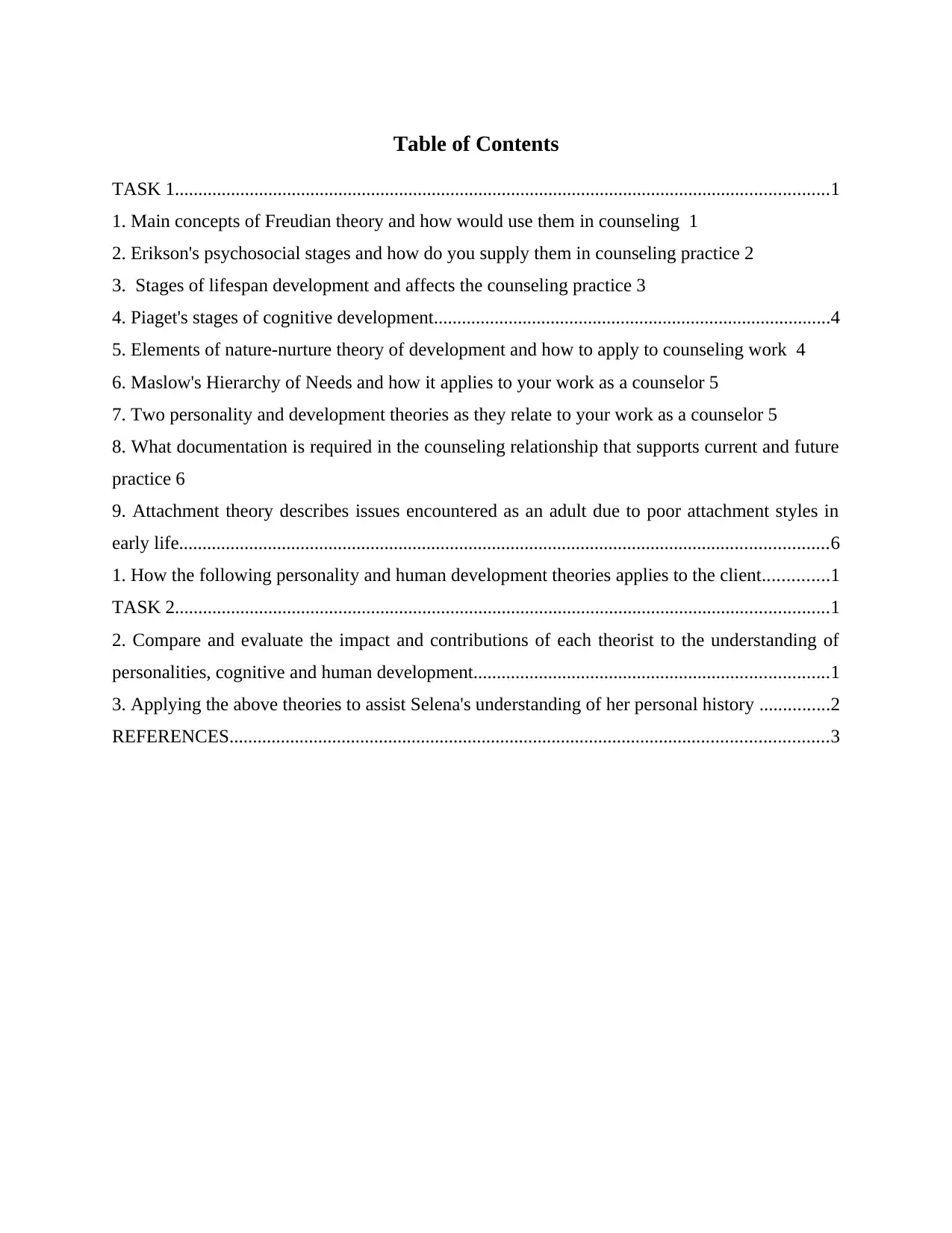
Table of Contents
TASK 1............................................................................................................................................1
1. Main concepts of Freudian theory and how would use them in counseling 1
2. Erikson's psychosocial stages and how do you supply them in counseling practice 2
3. Stages of lifespan development and affects the counseling practice 3
4. Piaget's stages of cognitive development.....................................................................................4
5. Elements of nature-nurture theory of development and how to apply to counseling work 4
6. Maslow's Hierarchy of Needs and how it applies to your work as a counselor 5
7. Two personality and development theories as they relate to your work as a counselor 5
8. What documentation is required in the counseling relationship that supports current and future
practice 6
9. Attachment theory describes issues encountered as an adult due to poor attachment styles in
early life...........................................................................................................................................6
1. How the following personality and human development theories applies to the client..............1
TASK 2............................................................................................................................................1
2. Compare and evaluate the impact and contributions of each theorist to the understanding of
personalities, cognitive and human development............................................................................1
3. Applying the above theories to assist Selena's understanding of her personal history ...............2
REFERENCES................................................................................................................................3
TASK 1............................................................................................................................................1
1. Main concepts of Freudian theory and how would use them in counseling 1
2. Erikson's psychosocial stages and how do you supply them in counseling practice 2
3. Stages of lifespan development and affects the counseling practice 3
4. Piaget's stages of cognitive development.....................................................................................4
5. Elements of nature-nurture theory of development and how to apply to counseling work 4
6. Maslow's Hierarchy of Needs and how it applies to your work as a counselor 5
7. Two personality and development theories as they relate to your work as a counselor 5
8. What documentation is required in the counseling relationship that supports current and future
practice 6
9. Attachment theory describes issues encountered as an adult due to poor attachment styles in
early life...........................................................................................................................................6
1. How the following personality and human development theories applies to the client..............1
TASK 2............................................................................................................................................1
2. Compare and evaluate the impact and contributions of each theorist to the understanding of
personalities, cognitive and human development............................................................................1
3. Applying the above theories to assist Selena's understanding of her personal history ...............2
REFERENCES................................................................................................................................3

⊘ This is a preview!⊘
Do you want full access?
Subscribe today to unlock all pages.

Trusted by 1+ million students worldwide
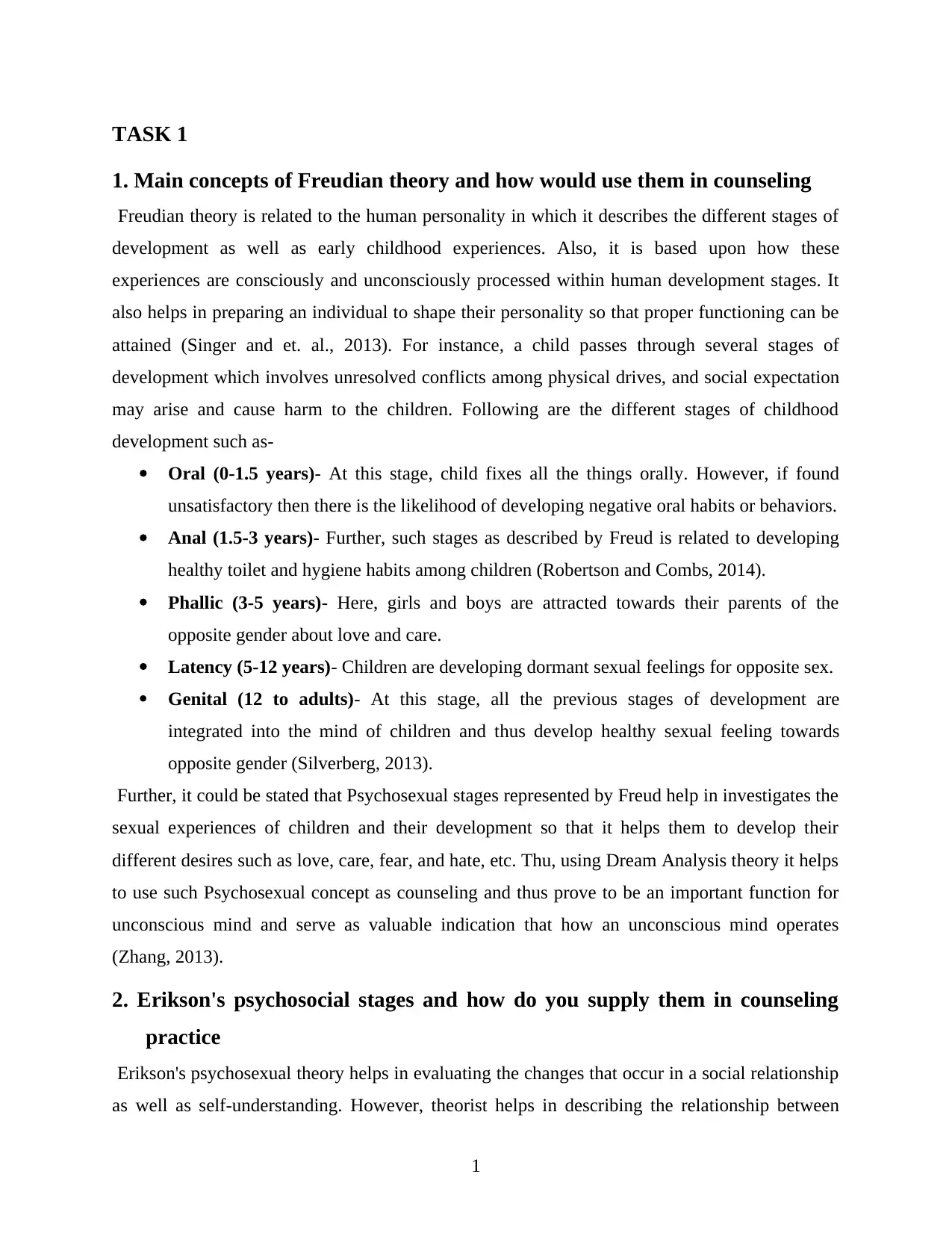
TASK 1
1. Main concepts of Freudian theory and how would use them in counseling
Freudian theory is related to the human personality in which it describes the different stages of
development as well as early childhood experiences. Also, it is based upon how these
experiences are consciously and unconsciously processed within human development stages. It
also helps in preparing an individual to shape their personality so that proper functioning can be
attained (Singer and et. al., 2013). For instance, a child passes through several stages of
development which involves unresolved conflicts among physical drives, and social expectation
may arise and cause harm to the children. Following are the different stages of childhood
development such as-
Oral (0-1.5 years)- At this stage, child fixes all the things orally. However, if found
unsatisfactory then there is the likelihood of developing negative oral habits or behaviors.
Anal (1.5-3 years)- Further, such stages as described by Freud is related to developing
healthy toilet and hygiene habits among children (Robertson and Combs, 2014).
Phallic (3-5 years)- Here, girls and boys are attracted towards their parents of the
opposite gender about love and care.
Latency (5-12 years)- Children are developing dormant sexual feelings for opposite sex.
Genital (12 to adults)- At this stage, all the previous stages of development are
integrated into the mind of children and thus develop healthy sexual feeling towards
opposite gender (Silverberg, 2013).
Further, it could be stated that Psychosexual stages represented by Freud help in investigates the
sexual experiences of children and their development so that it helps them to develop their
different desires such as love, care, fear, and hate, etc. Thu, using Dream Analysis theory it helps
to use such Psychosexual concept as counseling and thus prove to be an important function for
unconscious mind and serve as valuable indication that how an unconscious mind operates
(Zhang, 2013).
2. Erikson's psychosocial stages and how do you supply them in counseling
practice
Erikson's psychosexual theory helps in evaluating the changes that occur in a social relationship
as well as self-understanding. However, theorist helps in describing the relationship between
1
1. Main concepts of Freudian theory and how would use them in counseling
Freudian theory is related to the human personality in which it describes the different stages of
development as well as early childhood experiences. Also, it is based upon how these
experiences are consciously and unconsciously processed within human development stages. It
also helps in preparing an individual to shape their personality so that proper functioning can be
attained (Singer and et. al., 2013). For instance, a child passes through several stages of
development which involves unresolved conflicts among physical drives, and social expectation
may arise and cause harm to the children. Following are the different stages of childhood
development such as-
Oral (0-1.5 years)- At this stage, child fixes all the things orally. However, if found
unsatisfactory then there is the likelihood of developing negative oral habits or behaviors.
Anal (1.5-3 years)- Further, such stages as described by Freud is related to developing
healthy toilet and hygiene habits among children (Robertson and Combs, 2014).
Phallic (3-5 years)- Here, girls and boys are attracted towards their parents of the
opposite gender about love and care.
Latency (5-12 years)- Children are developing dormant sexual feelings for opposite sex.
Genital (12 to adults)- At this stage, all the previous stages of development are
integrated into the mind of children and thus develop healthy sexual feeling towards
opposite gender (Silverberg, 2013).
Further, it could be stated that Psychosexual stages represented by Freud help in investigates the
sexual experiences of children and their development so that it helps them to develop their
different desires such as love, care, fear, and hate, etc. Thu, using Dream Analysis theory it helps
to use such Psychosexual concept as counseling and thus prove to be an important function for
unconscious mind and serve as valuable indication that how an unconscious mind operates
(Zhang, 2013).
2. Erikson's psychosocial stages and how do you supply them in counseling
practice
Erikson's psychosexual theory helps in evaluating the changes that occur in a social relationship
as well as self-understanding. However, theorist helps in describing the relationship between
1
Paraphrase This Document
Need a fresh take? Get an instant paraphrase of this document with our AI Paraphraser
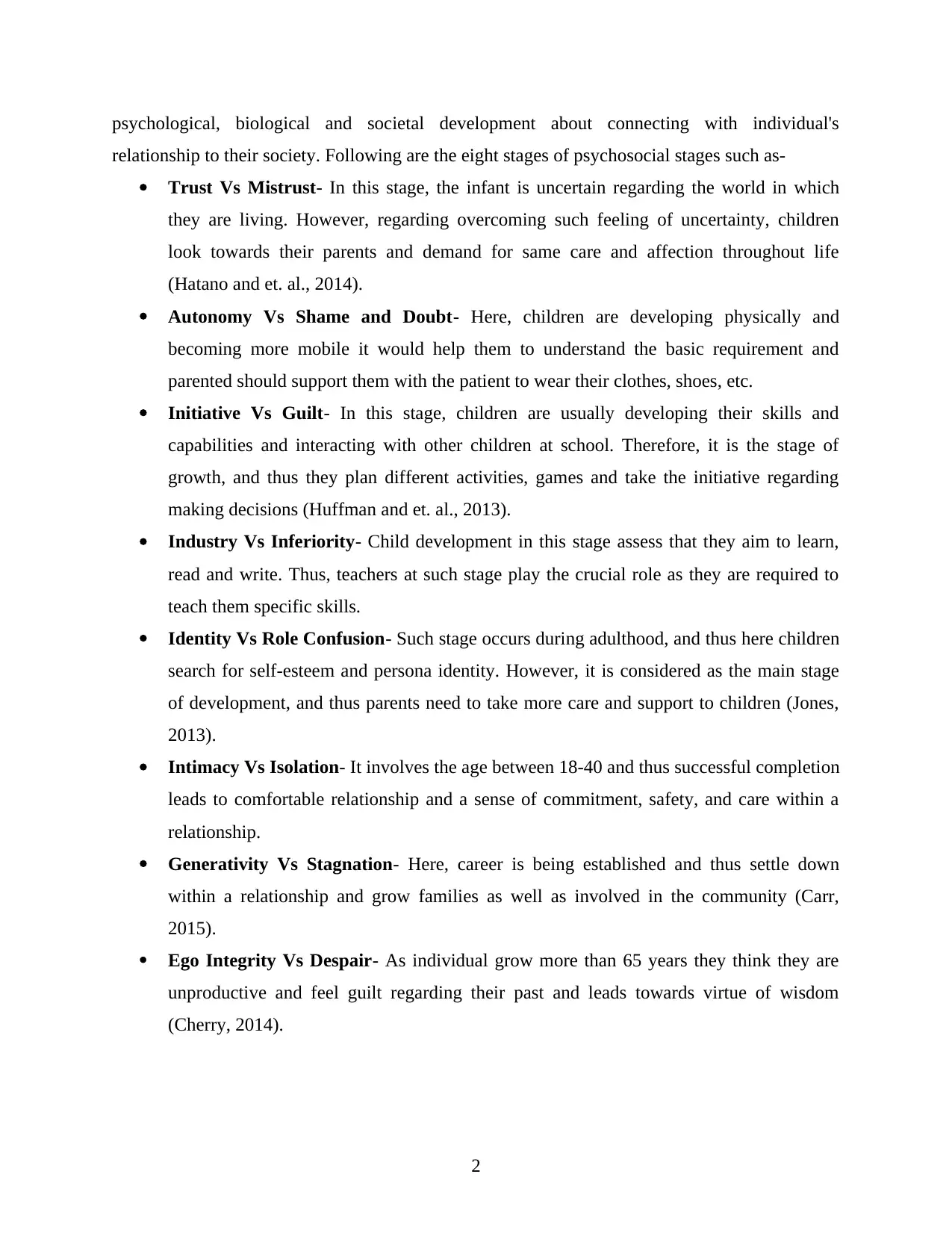
psychological, biological and societal development about connecting with individual's
relationship to their society. Following are the eight stages of psychosocial stages such as-
Trust Vs Mistrust- In this stage, the infant is uncertain regarding the world in which
they are living. However, regarding overcoming such feeling of uncertainty, children
look towards their parents and demand for same care and affection throughout life
(Hatano and et. al., 2014).
Autonomy Vs Shame and Doubt- Here, children are developing physically and
becoming more mobile it would help them to understand the basic requirement and
parented should support them with the patient to wear their clothes, shoes, etc.
Initiative Vs Guilt- In this stage, children are usually developing their skills and
capabilities and interacting with other children at school. Therefore, it is the stage of
growth, and thus they plan different activities, games and take the initiative regarding
making decisions (Huffman and et. al., 2013).
Industry Vs Inferiority- Child development in this stage assess that they aim to learn,
read and write. Thus, teachers at such stage play the crucial role as they are required to
teach them specific skills.
Identity Vs Role Confusion- Such stage occurs during adulthood, and thus here children
search for self-esteem and persona identity. However, it is considered as the main stage
of development, and thus parents need to take more care and support to children (Jones,
2013).
Intimacy Vs Isolation- It involves the age between 18-40 and thus successful completion
leads to comfortable relationship and a sense of commitment, safety, and care within a
relationship.
Generativity Vs Stagnation- Here, career is being established and thus settle down
within a relationship and grow families as well as involved in the community (Carr,
2015).
Ego Integrity Vs Despair- As individual grow more than 65 years they think they are
unproductive and feel guilt regarding their past and leads towards virtue of wisdom
(Cherry, 2014).
2
relationship to their society. Following are the eight stages of psychosocial stages such as-
Trust Vs Mistrust- In this stage, the infant is uncertain regarding the world in which
they are living. However, regarding overcoming such feeling of uncertainty, children
look towards their parents and demand for same care and affection throughout life
(Hatano and et. al., 2014).
Autonomy Vs Shame and Doubt- Here, children are developing physically and
becoming more mobile it would help them to understand the basic requirement and
parented should support them with the patient to wear their clothes, shoes, etc.
Initiative Vs Guilt- In this stage, children are usually developing their skills and
capabilities and interacting with other children at school. Therefore, it is the stage of
growth, and thus they plan different activities, games and take the initiative regarding
making decisions (Huffman and et. al., 2013).
Industry Vs Inferiority- Child development in this stage assess that they aim to learn,
read and write. Thus, teachers at such stage play the crucial role as they are required to
teach them specific skills.
Identity Vs Role Confusion- Such stage occurs during adulthood, and thus here children
search for self-esteem and persona identity. However, it is considered as the main stage
of development, and thus parents need to take more care and support to children (Jones,
2013).
Intimacy Vs Isolation- It involves the age between 18-40 and thus successful completion
leads to comfortable relationship and a sense of commitment, safety, and care within a
relationship.
Generativity Vs Stagnation- Here, career is being established and thus settle down
within a relationship and grow families as well as involved in the community (Carr,
2015).
Ego Integrity Vs Despair- As individual grow more than 65 years they think they are
unproductive and feel guilt regarding their past and leads towards virtue of wisdom
(Cherry, 2014).
2
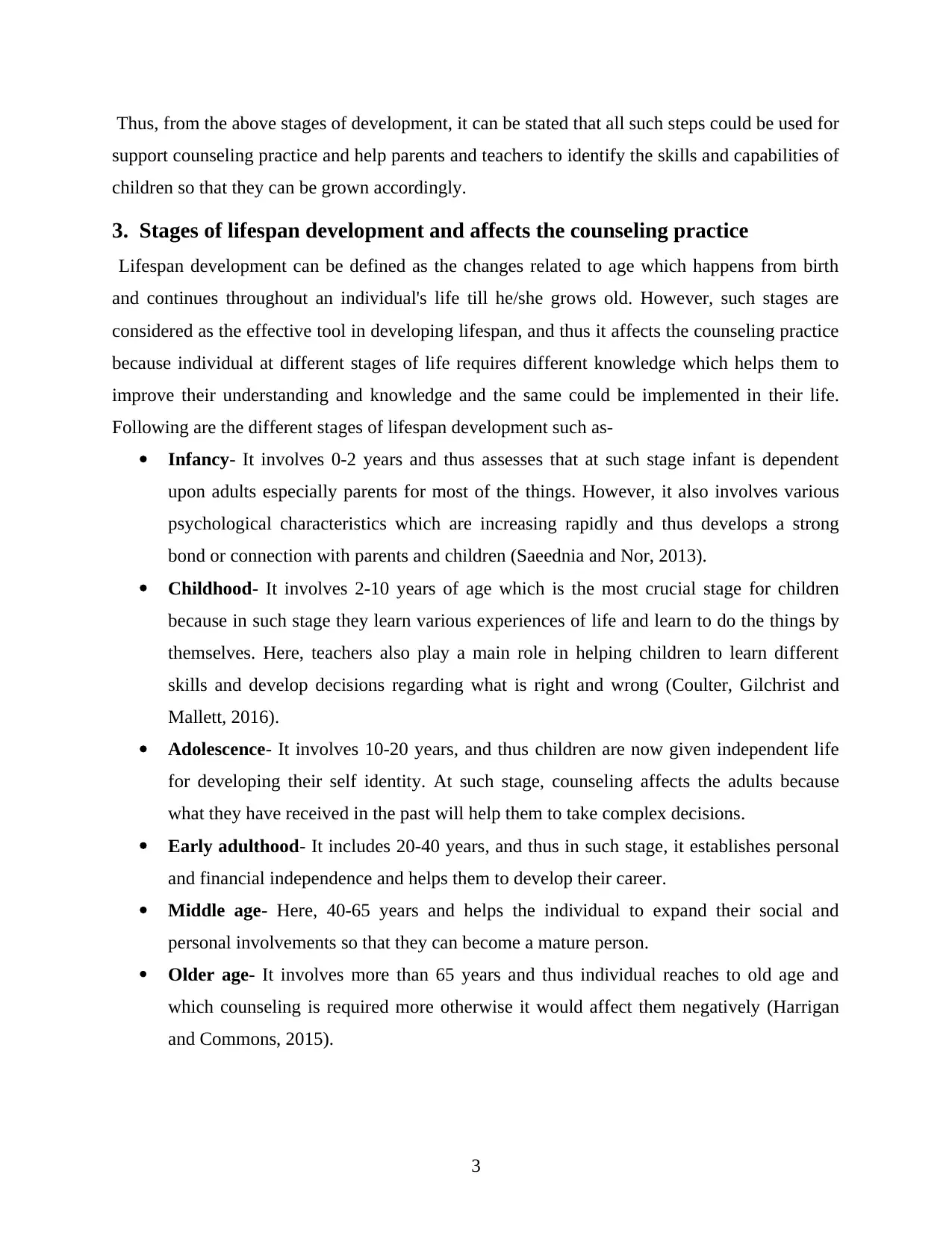
Thus, from the above stages of development, it can be stated that all such steps could be used for
support counseling practice and help parents and teachers to identify the skills and capabilities of
children so that they can be grown accordingly.
3. Stages of lifespan development and affects the counseling practice
Lifespan development can be defined as the changes related to age which happens from birth
and continues throughout an individual's life till he/she grows old. However, such stages are
considered as the effective tool in developing lifespan, and thus it affects the counseling practice
because individual at different stages of life requires different knowledge which helps them to
improve their understanding and knowledge and the same could be implemented in their life.
Following are the different stages of lifespan development such as-
Infancy- It involves 0-2 years and thus assesses that at such stage infant is dependent
upon adults especially parents for most of the things. However, it also involves various
psychological characteristics which are increasing rapidly and thus develops a strong
bond or connection with parents and children (Saeednia and Nor, 2013).
Childhood- It involves 2-10 years of age which is the most crucial stage for children
because in such stage they learn various experiences of life and learn to do the things by
themselves. Here, teachers also play a main role in helping children to learn different
skills and develop decisions regarding what is right and wrong (Coulter, Gilchrist and
Mallett, 2016).
Adolescence- It involves 10-20 years, and thus children are now given independent life
for developing their self identity. At such stage, counseling affects the adults because
what they have received in the past will help them to take complex decisions.
Early adulthood- It includes 20-40 years, and thus in such stage, it establishes personal
and financial independence and helps them to develop their career.
Middle age- Here, 40-65 years and helps the individual to expand their social and
personal involvements so that they can become a mature person.
Older age- It involves more than 65 years and thus individual reaches to old age and
which counseling is required more otherwise it would affect them negatively (Harrigan
and Commons, 2015).
3
support counseling practice and help parents and teachers to identify the skills and capabilities of
children so that they can be grown accordingly.
3. Stages of lifespan development and affects the counseling practice
Lifespan development can be defined as the changes related to age which happens from birth
and continues throughout an individual's life till he/she grows old. However, such stages are
considered as the effective tool in developing lifespan, and thus it affects the counseling practice
because individual at different stages of life requires different knowledge which helps them to
improve their understanding and knowledge and the same could be implemented in their life.
Following are the different stages of lifespan development such as-
Infancy- It involves 0-2 years and thus assesses that at such stage infant is dependent
upon adults especially parents for most of the things. However, it also involves various
psychological characteristics which are increasing rapidly and thus develops a strong
bond or connection with parents and children (Saeednia and Nor, 2013).
Childhood- It involves 2-10 years of age which is the most crucial stage for children
because in such stage they learn various experiences of life and learn to do the things by
themselves. Here, teachers also play a main role in helping children to learn different
skills and develop decisions regarding what is right and wrong (Coulter, Gilchrist and
Mallett, 2016).
Adolescence- It involves 10-20 years, and thus children are now given independent life
for developing their self identity. At such stage, counseling affects the adults because
what they have received in the past will help them to take complex decisions.
Early adulthood- It includes 20-40 years, and thus in such stage, it establishes personal
and financial independence and helps them to develop their career.
Middle age- Here, 40-65 years and helps the individual to expand their social and
personal involvements so that they can become a mature person.
Older age- It involves more than 65 years and thus individual reaches to old age and
which counseling is required more otherwise it would affect them negatively (Harrigan
and Commons, 2015).
3
⊘ This is a preview!⊘
Do you want full access?
Subscribe today to unlock all pages.

Trusted by 1+ million students worldwide
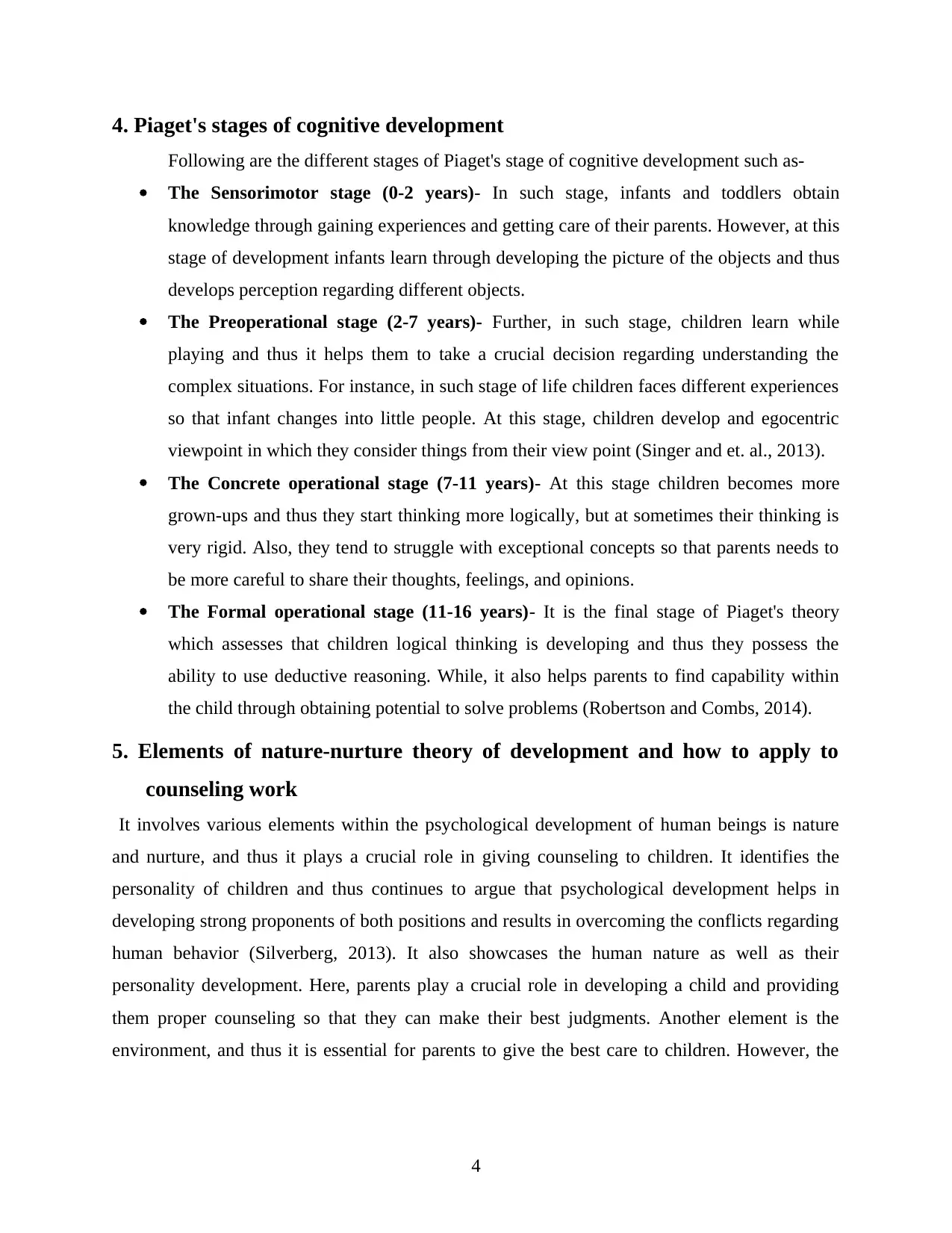
4. Piaget's stages of cognitive development
Following are the different stages of Piaget's stage of cognitive development such as-
The Sensorimotor stage (0-2 years)- In such stage, infants and toddlers obtain
knowledge through gaining experiences and getting care of their parents. However, at this
stage of development infants learn through developing the picture of the objects and thus
develops perception regarding different objects.
The Preoperational stage (2-7 years)- Further, in such stage, children learn while
playing and thus it helps them to take a crucial decision regarding understanding the
complex situations. For instance, in such stage of life children faces different experiences
so that infant changes into little people. At this stage, children develop and egocentric
viewpoint in which they consider things from their view point (Singer and et. al., 2013).
The Concrete operational stage (7-11 years)- At this stage children becomes more
grown-ups and thus they start thinking more logically, but at sometimes their thinking is
very rigid. Also, they tend to struggle with exceptional concepts so that parents needs to
be more careful to share their thoughts, feelings, and opinions.
The Formal operational stage (11-16 years)- It is the final stage of Piaget's theory
which assesses that children logical thinking is developing and thus they possess the
ability to use deductive reasoning. While, it also helps parents to find capability within
the child through obtaining potential to solve problems (Robertson and Combs, 2014).
5. Elements of nature-nurture theory of development and how to apply to
counseling work
It involves various elements within the psychological development of human beings is nature
and nurture, and thus it plays a crucial role in giving counseling to children. It identifies the
personality of children and thus continues to argue that psychological development helps in
developing strong proponents of both positions and results in overcoming the conflicts regarding
human behavior (Silverberg, 2013). It also showcases the human nature as well as their
personality development. Here, parents play a crucial role in developing a child and providing
them proper counseling so that they can make their best judgments. Another element is the
environment, and thus it is essential for parents to give the best care to children. However, the
4
Following are the different stages of Piaget's stage of cognitive development such as-
The Sensorimotor stage (0-2 years)- In such stage, infants and toddlers obtain
knowledge through gaining experiences and getting care of their parents. However, at this
stage of development infants learn through developing the picture of the objects and thus
develops perception regarding different objects.
The Preoperational stage (2-7 years)- Further, in such stage, children learn while
playing and thus it helps them to take a crucial decision regarding understanding the
complex situations. For instance, in such stage of life children faces different experiences
so that infant changes into little people. At this stage, children develop and egocentric
viewpoint in which they consider things from their view point (Singer and et. al., 2013).
The Concrete operational stage (7-11 years)- At this stage children becomes more
grown-ups and thus they start thinking more logically, but at sometimes their thinking is
very rigid. Also, they tend to struggle with exceptional concepts so that parents needs to
be more careful to share their thoughts, feelings, and opinions.
The Formal operational stage (11-16 years)- It is the final stage of Piaget's theory
which assesses that children logical thinking is developing and thus they possess the
ability to use deductive reasoning. While, it also helps parents to find capability within
the child through obtaining potential to solve problems (Robertson and Combs, 2014).
5. Elements of nature-nurture theory of development and how to apply to
counseling work
It involves various elements within the psychological development of human beings is nature
and nurture, and thus it plays a crucial role in giving counseling to children. It identifies the
personality of children and thus continues to argue that psychological development helps in
developing strong proponents of both positions and results in overcoming the conflicts regarding
human behavior (Silverberg, 2013). It also showcases the human nature as well as their
personality development. Here, parents play a crucial role in developing a child and providing
them proper counseling so that they can make their best judgments. Another element is the
environment, and thus it is essential for parents to give the best care to children. However, the
4
Paraphrase This Document
Need a fresh take? Get an instant paraphrase of this document with our AI Paraphraser
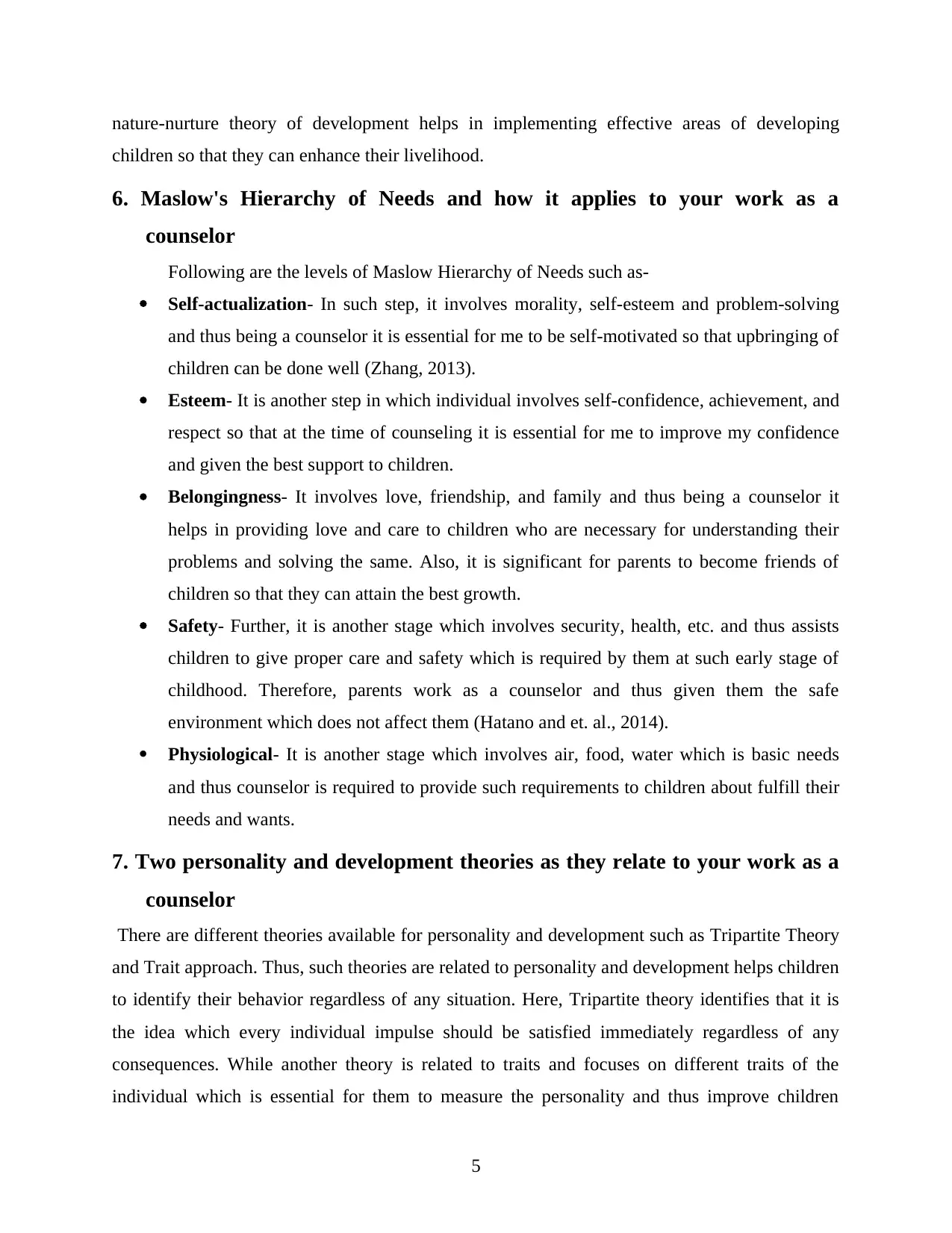
nature-nurture theory of development helps in implementing effective areas of developing
children so that they can enhance their livelihood.
6. Maslow's Hierarchy of Needs and how it applies to your work as a
counselor
Following are the levels of Maslow Hierarchy of Needs such as-
Self-actualization- In such step, it involves morality, self-esteem and problem-solving
and thus being a counselor it is essential for me to be self-motivated so that upbringing of
children can be done well (Zhang, 2013).
Esteem- It is another step in which individual involves self-confidence, achievement, and
respect so that at the time of counseling it is essential for me to improve my confidence
and given the best support to children.
Belongingness- It involves love, friendship, and family and thus being a counselor it
helps in providing love and care to children who are necessary for understanding their
problems and solving the same. Also, it is significant for parents to become friends of
children so that they can attain the best growth.
Safety- Further, it is another stage which involves security, health, etc. and thus assists
children to give proper care and safety which is required by them at such early stage of
childhood. Therefore, parents work as a counselor and thus given them the safe
environment which does not affect them (Hatano and et. al., 2014).
Physiological- It is another stage which involves air, food, water which is basic needs
and thus counselor is required to provide such requirements to children about fulfill their
needs and wants.
7. Two personality and development theories as they relate to your work as a
counselor
There are different theories available for personality and development such as Tripartite Theory
and Trait approach. Thus, such theories are related to personality and development helps children
to identify their behavior regardless of any situation. Here, Tripartite theory identifies that it is
the idea which every individual impulse should be satisfied immediately regardless of any
consequences. While another theory is related to traits and focuses on different traits of the
individual which is essential for them to measure the personality and thus improve children
5
children so that they can enhance their livelihood.
6. Maslow's Hierarchy of Needs and how it applies to your work as a
counselor
Following are the levels of Maslow Hierarchy of Needs such as-
Self-actualization- In such step, it involves morality, self-esteem and problem-solving
and thus being a counselor it is essential for me to be self-motivated so that upbringing of
children can be done well (Zhang, 2013).
Esteem- It is another step in which individual involves self-confidence, achievement, and
respect so that at the time of counseling it is essential for me to improve my confidence
and given the best support to children.
Belongingness- It involves love, friendship, and family and thus being a counselor it
helps in providing love and care to children who are necessary for understanding their
problems and solving the same. Also, it is significant for parents to become friends of
children so that they can attain the best growth.
Safety- Further, it is another stage which involves security, health, etc. and thus assists
children to give proper care and safety which is required by them at such early stage of
childhood. Therefore, parents work as a counselor and thus given them the safe
environment which does not affect them (Hatano and et. al., 2014).
Physiological- It is another stage which involves air, food, water which is basic needs
and thus counselor is required to provide such requirements to children about fulfill their
needs and wants.
7. Two personality and development theories as they relate to your work as a
counselor
There are different theories available for personality and development such as Tripartite Theory
and Trait approach. Thus, such theories are related to personality and development helps children
to identify their behavior regardless of any situation. Here, Tripartite theory identifies that it is
the idea which every individual impulse should be satisfied immediately regardless of any
consequences. While another theory is related to traits and focuses on different traits of the
individual which is essential for them to measure the personality and thus improve children
5
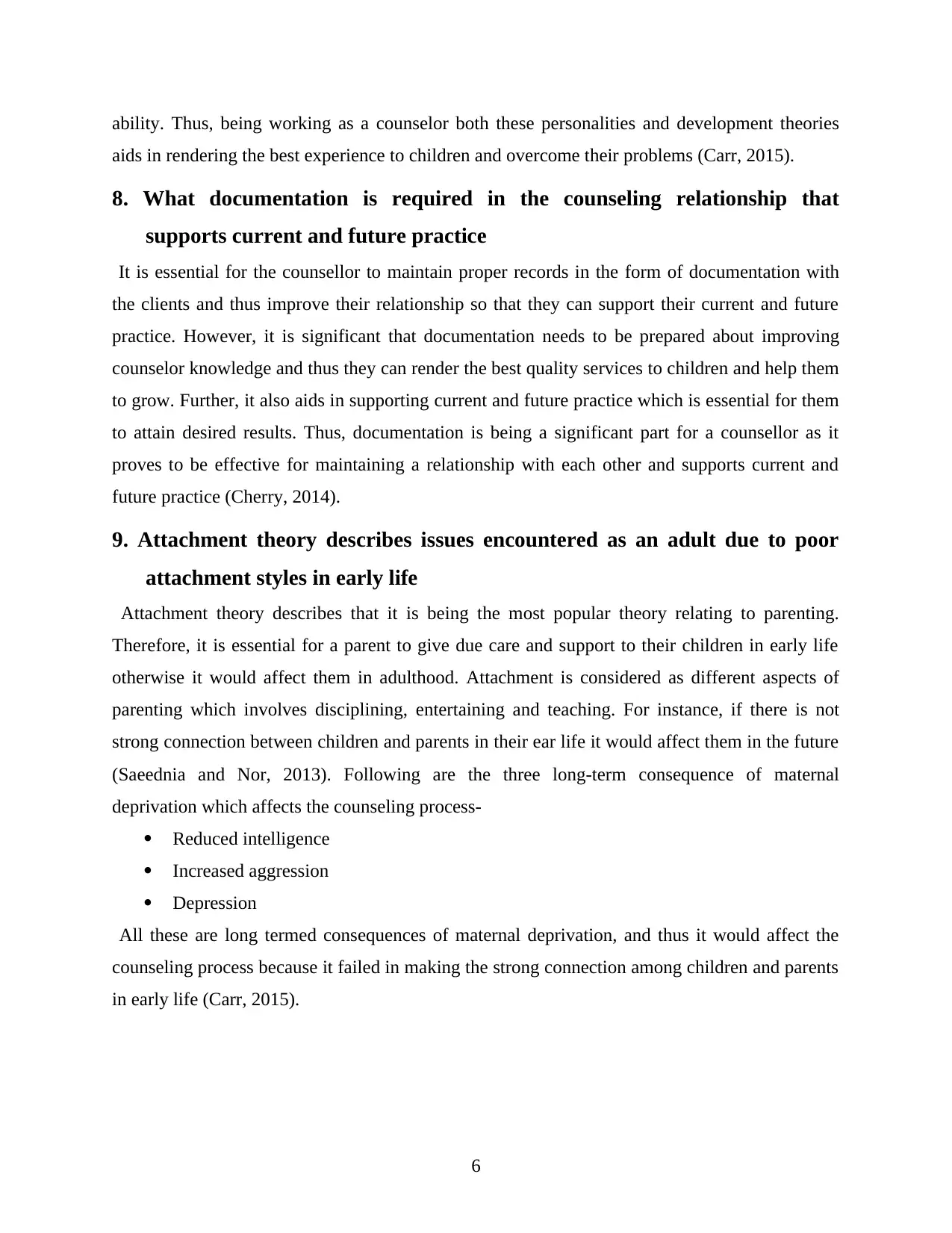
ability. Thus, being working as a counselor both these personalities and development theories
aids in rendering the best experience to children and overcome their problems (Carr, 2015).
8. What documentation is required in the counseling relationship that
supports current and future practice
It is essential for the counsellor to maintain proper records in the form of documentation with
the clients and thus improve their relationship so that they can support their current and future
practice. However, it is significant that documentation needs to be prepared about improving
counselor knowledge and thus they can render the best quality services to children and help them
to grow. Further, it also aids in supporting current and future practice which is essential for them
to attain desired results. Thus, documentation is being a significant part for a counsellor as it
proves to be effective for maintaining a relationship with each other and supports current and
future practice (Cherry, 2014).
9. Attachment theory describes issues encountered as an adult due to poor
attachment styles in early life
Attachment theory describes that it is being the most popular theory relating to parenting.
Therefore, it is essential for a parent to give due care and support to their children in early life
otherwise it would affect them in adulthood. Attachment is considered as different aspects of
parenting which involves disciplining, entertaining and teaching. For instance, if there is not
strong connection between children and parents in their ear life it would affect them in the future
(Saeednia and Nor, 2013). Following are the three long-term consequence of maternal
deprivation which affects the counseling process-
Reduced intelligence
Increased aggression
Depression
All these are long termed consequences of maternal deprivation, and thus it would affect the
counseling process because it failed in making the strong connection among children and parents
in early life (Carr, 2015).
6
aids in rendering the best experience to children and overcome their problems (Carr, 2015).
8. What documentation is required in the counseling relationship that
supports current and future practice
It is essential for the counsellor to maintain proper records in the form of documentation with
the clients and thus improve their relationship so that they can support their current and future
practice. However, it is significant that documentation needs to be prepared about improving
counselor knowledge and thus they can render the best quality services to children and help them
to grow. Further, it also aids in supporting current and future practice which is essential for them
to attain desired results. Thus, documentation is being a significant part for a counsellor as it
proves to be effective for maintaining a relationship with each other and supports current and
future practice (Cherry, 2014).
9. Attachment theory describes issues encountered as an adult due to poor
attachment styles in early life
Attachment theory describes that it is being the most popular theory relating to parenting.
Therefore, it is essential for a parent to give due care and support to their children in early life
otherwise it would affect them in adulthood. Attachment is considered as different aspects of
parenting which involves disciplining, entertaining and teaching. For instance, if there is not
strong connection between children and parents in their ear life it would affect them in the future
(Saeednia and Nor, 2013). Following are the three long-term consequence of maternal
deprivation which affects the counseling process-
Reduced intelligence
Increased aggression
Depression
All these are long termed consequences of maternal deprivation, and thus it would affect the
counseling process because it failed in making the strong connection among children and parents
in early life (Carr, 2015).
6
⊘ This is a preview!⊘
Do you want full access?
Subscribe today to unlock all pages.

Trusted by 1+ million students worldwide
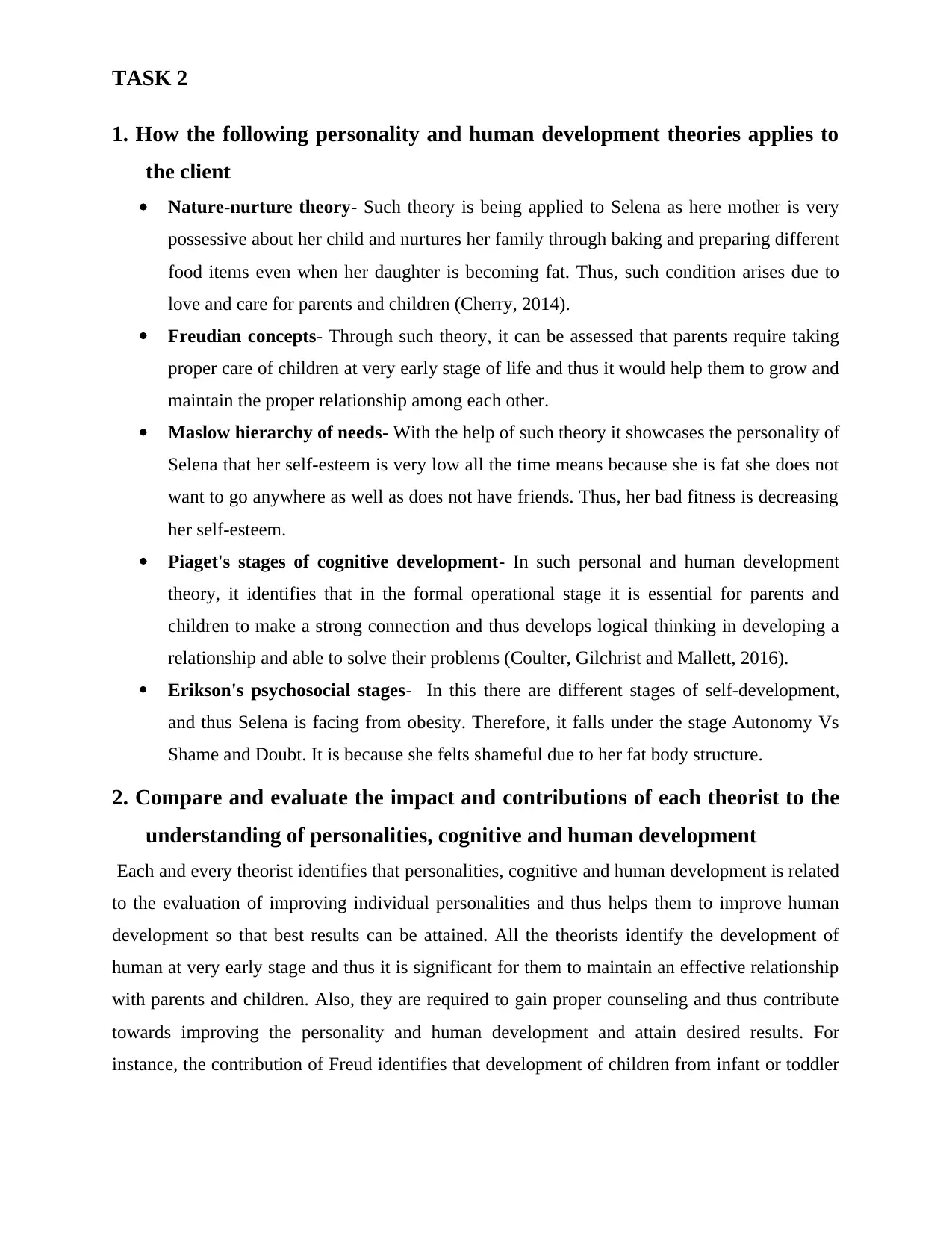
TASK 2
1. How the following personality and human development theories applies to
the client
Nature-nurture theory- Such theory is being applied to Selena as here mother is very
possessive about her child and nurtures her family through baking and preparing different
food items even when her daughter is becoming fat. Thus, such condition arises due to
love and care for parents and children (Cherry, 2014).
Freudian concepts- Through such theory, it can be assessed that parents require taking
proper care of children at very early stage of life and thus it would help them to grow and
maintain the proper relationship among each other.
Maslow hierarchy of needs- With the help of such theory it showcases the personality of
Selena that her self-esteem is very low all the time means because she is fat she does not
want to go anywhere as well as does not have friends. Thus, her bad fitness is decreasing
her self-esteem.
Piaget's stages of cognitive development- In such personal and human development
theory, it identifies that in the formal operational stage it is essential for parents and
children to make a strong connection and thus develops logical thinking in developing a
relationship and able to solve their problems (Coulter, Gilchrist and Mallett, 2016).
Erikson's psychosocial stages- In this there are different stages of self-development,
and thus Selena is facing from obesity. Therefore, it falls under the stage Autonomy Vs
Shame and Doubt. It is because she felts shameful due to her fat body structure.
2. Compare and evaluate the impact and contributions of each theorist to the
understanding of personalities, cognitive and human development
Each and every theorist identifies that personalities, cognitive and human development is related
to the evaluation of improving individual personalities and thus helps them to improve human
development so that best results can be attained. All the theorists identify the development of
human at very early stage and thus it is significant for them to maintain an effective relationship
with parents and children. Also, they are required to gain proper counseling and thus contribute
towards improving the personality and human development and attain desired results. For
instance, the contribution of Freud identifies that development of children from infant or toddler
1. How the following personality and human development theories applies to
the client
Nature-nurture theory- Such theory is being applied to Selena as here mother is very
possessive about her child and nurtures her family through baking and preparing different
food items even when her daughter is becoming fat. Thus, such condition arises due to
love and care for parents and children (Cherry, 2014).
Freudian concepts- Through such theory, it can be assessed that parents require taking
proper care of children at very early stage of life and thus it would help them to grow and
maintain the proper relationship among each other.
Maslow hierarchy of needs- With the help of such theory it showcases the personality of
Selena that her self-esteem is very low all the time means because she is fat she does not
want to go anywhere as well as does not have friends. Thus, her bad fitness is decreasing
her self-esteem.
Piaget's stages of cognitive development- In such personal and human development
theory, it identifies that in the formal operational stage it is essential for parents and
children to make a strong connection and thus develops logical thinking in developing a
relationship and able to solve their problems (Coulter, Gilchrist and Mallett, 2016).
Erikson's psychosocial stages- In this there are different stages of self-development,
and thus Selena is facing from obesity. Therefore, it falls under the stage Autonomy Vs
Shame and Doubt. It is because she felts shameful due to her fat body structure.
2. Compare and evaluate the impact and contributions of each theorist to the
understanding of personalities, cognitive and human development
Each and every theorist identifies that personalities, cognitive and human development is related
to the evaluation of improving individual personalities and thus helps them to improve human
development so that best results can be attained. All the theorists identify the development of
human at very early stage and thus it is significant for them to maintain an effective relationship
with parents and children. Also, they are required to gain proper counseling and thus contribute
towards improving the personality and human development and attain desired results. For
instance, the contribution of Freud identifies that development of children from infant or toddler
Paraphrase This Document
Need a fresh take? Get an instant paraphrase of this document with our AI Paraphraser

to adulthood brings several changes and thus helps in improving their childhood (Harrigan and
Commons, 2015).
2
Commons, 2015).
2
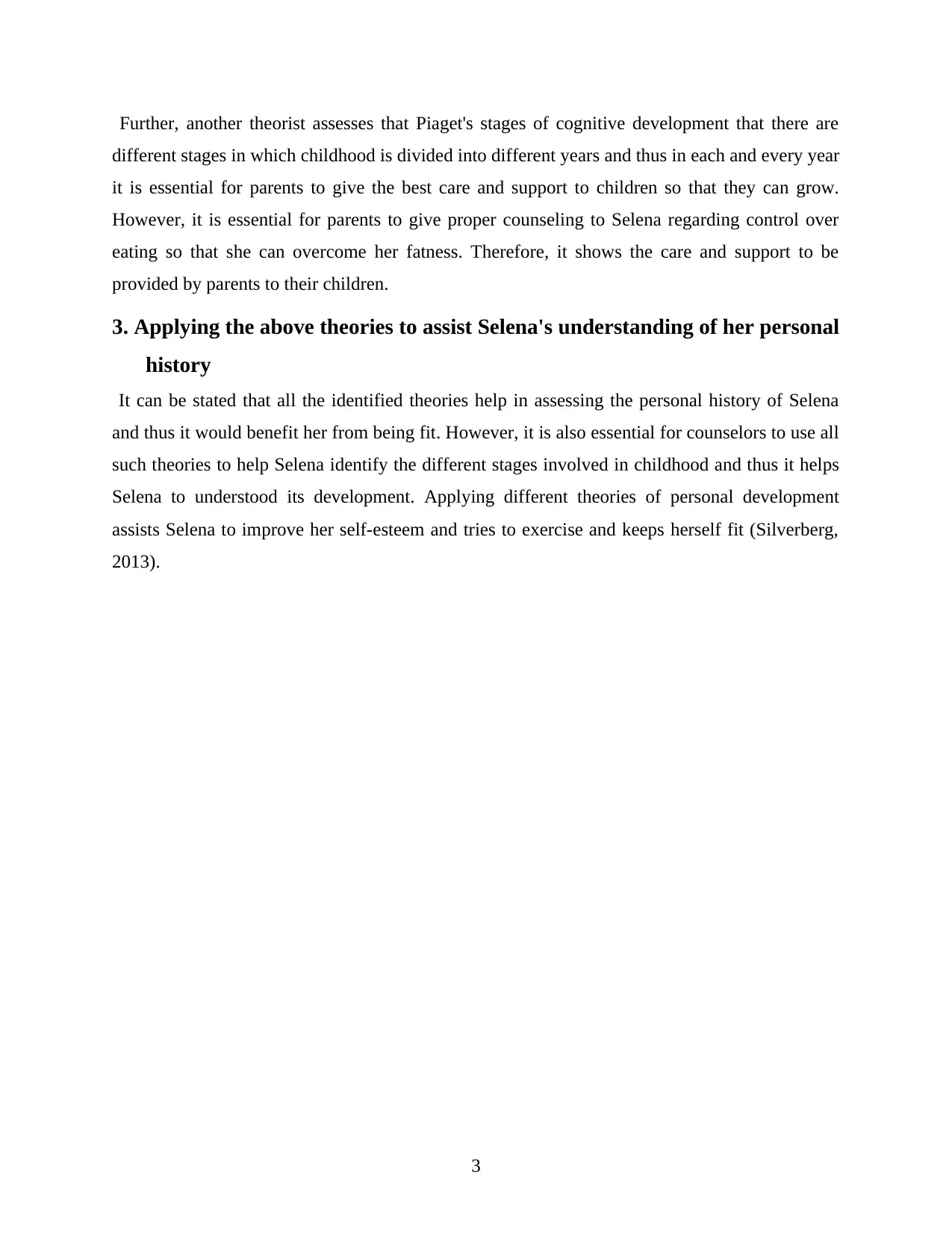
Further, another theorist assesses that Piaget's stages of cognitive development that there are
different stages in which childhood is divided into different years and thus in each and every year
it is essential for parents to give the best care and support to children so that they can grow.
However, it is essential for parents to give proper counseling to Selena regarding control over
eating so that she can overcome her fatness. Therefore, it shows the care and support to be
provided by parents to their children.
3. Applying the above theories to assist Selena's understanding of her personal
history
It can be stated that all the identified theories help in assessing the personal history of Selena
and thus it would benefit her from being fit. However, it is also essential for counselors to use all
such theories to help Selena identify the different stages involved in childhood and thus it helps
Selena to understood its development. Applying different theories of personal development
assists Selena to improve her self-esteem and tries to exercise and keeps herself fit (Silverberg,
2013).
3
different stages in which childhood is divided into different years and thus in each and every year
it is essential for parents to give the best care and support to children so that they can grow.
However, it is essential for parents to give proper counseling to Selena regarding control over
eating so that she can overcome her fatness. Therefore, it shows the care and support to be
provided by parents to their children.
3. Applying the above theories to assist Selena's understanding of her personal
history
It can be stated that all the identified theories help in assessing the personal history of Selena
and thus it would benefit her from being fit. However, it is also essential for counselors to use all
such theories to help Selena identify the different stages involved in childhood and thus it helps
Selena to understood its development. Applying different theories of personal development
assists Selena to improve her self-esteem and tries to exercise and keeps herself fit (Silverberg,
2013).
3
⊘ This is a preview!⊘
Do you want full access?
Subscribe today to unlock all pages.

Trusted by 1+ million students worldwide
1 out of 13
Related Documents
Your All-in-One AI-Powered Toolkit for Academic Success.
+13062052269
info@desklib.com
Available 24*7 on WhatsApp / Email
![[object Object]](/_next/static/media/star-bottom.7253800d.svg)
Unlock your academic potential
Copyright © 2020–2026 A2Z Services. All Rights Reserved. Developed and managed by ZUCOL.




